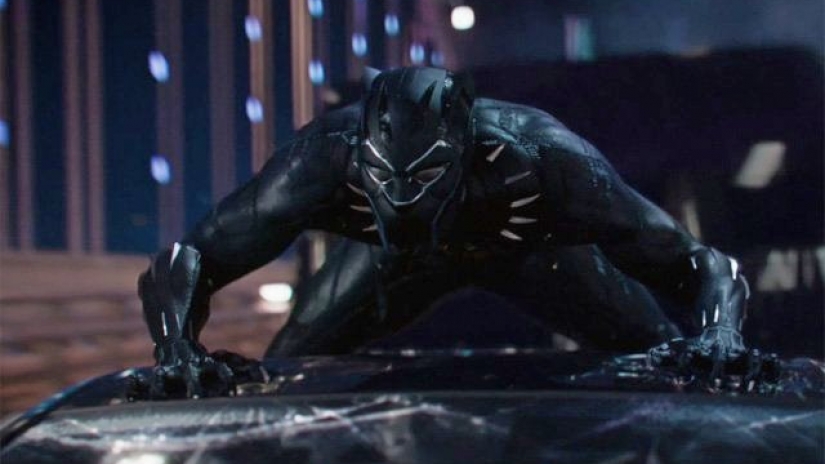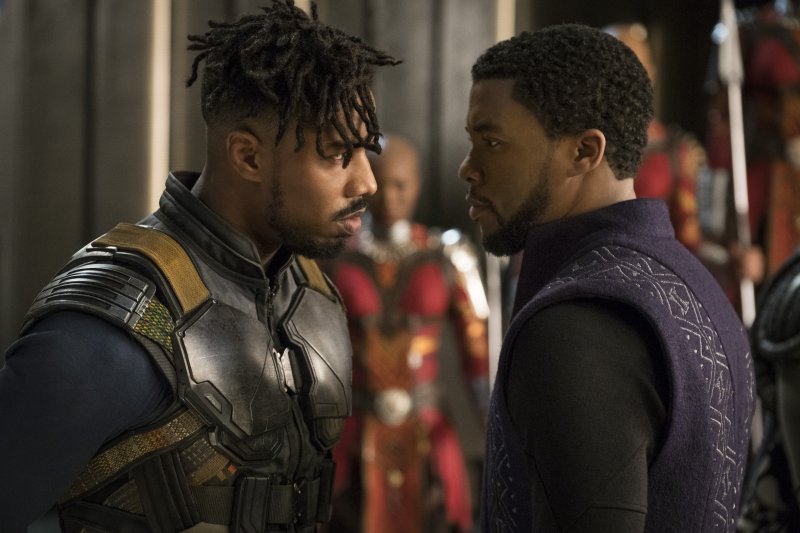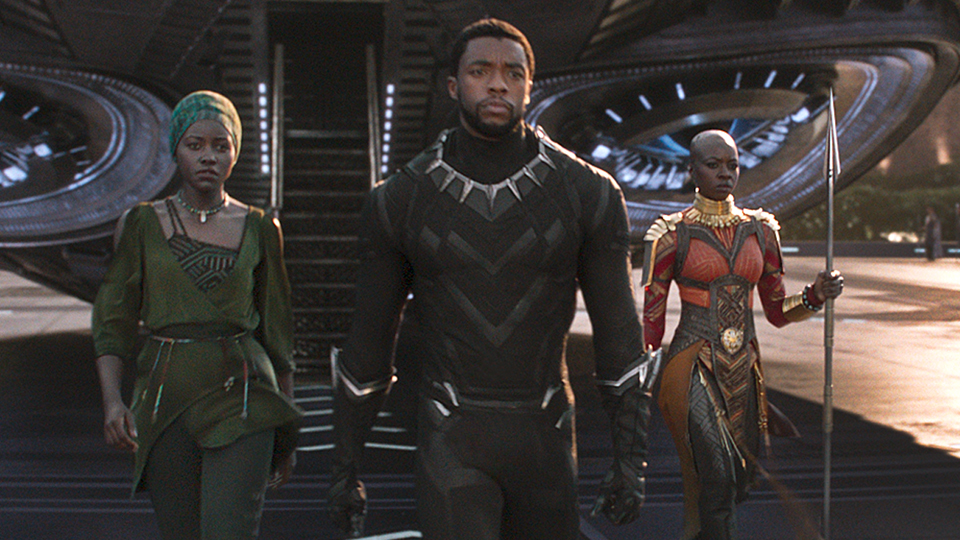Black Panther (2018)
CAST: Chadwick Boseman, Michael B. Jordan, Lupita Nyong’o, Angela Bassett, Forest Whitaker, Danai Gurira, Letitia Wright, Daniel Kaluuya, Martin Freeman, Andy Serkis, Winston Duke, Sterling K. Brown
REVIEW:
For those suffering from conventional superhero movie fatigue, Black Panther is different enough to feel a little fresher, even if it ultimately adheres to basic superhero movie expectations. Before agreeing to co-write and direct, Ryan Coogler (a “serious” director who previously helmed Fruitvale Station and Creed) ensured that he would be granted a considerable level of freedom and independence, and this might account for Black Panther feeling more like a unique entity unto itself and less cookie cutter than the likes of Spider-Man: Homecoming. The movie is also not overly concerned with reminding us it’s a part of the larger Marvel Cinematic Universe. Apart from some thin connective tissue, Black Panther can stand on its own as one of the few recent Marvel outings that could be watched without much confusion by a casual viewer who hasn’t kept up with the entire interconnected MCU.
Since inheriting the throne vacated by his father’s (John Kani) assassination in Captain America: Civil War, Prince T’Challa (Chadwick Boseman) returns home to ascend to the title of King of the (fictional) African nation of Wakanda. To the outside world, Wakanda is a third-world country mired in poverty. This image is a carefully maintained illusion; behind the veil, Wakanda boasts advanced technology beyond the rest of the world, powered by the precious mineral, Vibranium, which also provides the indestructible bodysuit of T’Challa’s alter ego, Black Panther, a power harnessed and adapted by T’Challa’s teenage genius sister Shuri (Letitia Wright). But the fledgling King is soon to learn that holding onto and figuring out how best to use power can be more challenging and treacherous than acquiring it in the first place. Shortly after his coronation, and accompanied by his military chief Okoye (Danai Gurira) and his ex-girlfriend Nakia (Lupita Nyong’o), T’Challa heads to South Korea to capture a slippery arms dealer, Ulysses Klaw (Andy Serkis), who has long been a thorn in Wakanda’s side selling stolen Vibranium on the black market. There, he runs into an old acquaintance, CIA agent Everett Ross (Martin Freeman)—with whom he briefly crossed paths in Civil War—whom he is obliged to take home to Wakanda and its advanced healing abilities when Ross takes a bullet for Nakia. And another complication pops up when special forces mercenary Erik Killmonger (Michael B. Jordan) comes knocking on Wakanda’s front door presenting a gift but wanting a lot in return.
The hype for Black Panther has become something bigger than the movie itself. Like Wonder Woman was for women, it’s viewed as an empowering film landmark starring a rare black superhero (though it’s worth noting Blade beat Black Panther to the screen by many years). And not only does Black Panther star a black man, it comes close to featuring an all-black cast (the only exceptions of any prominence are Martin Freeman and Andy Serkis, neither of whom are lead roles, and the obligatory Stan Lee cameo). Black Panther wears its social/political statements on its sleeve and doesn’t shy away from real-life issues. Our primary villain Erik Killmonger is a radical black activist who sees the Wakandans’ isolationism as perching in their ivory tower and leaving less fortunate black people around the world to fend for themselves, and seeks to commandeer its resources to take matters into his own violent hands. The movie also makes a thinly-veiled jab at the current US presidential administration with a closing UN speech by T’Challa rebuking those who “build barriers”. Ultimately, common humanity is emphasized and both Wakanda’s isolationism and Killmonger’s violent extremism are repudiated. Also, the movie takes pains to inject a level of moral gray area by showing us how Killmonger was molded into the villain he’s become by questionable past actions of men previously seen as unimpeachably noble. The ways in which these themes are incorporated isn’t exactly subtle, but the movie strives to be “about” something beyond just superhero derring-do.
 Black Panther is a strong contender when it comes to costume and production design. The blend of sci-fi technology and tribal customs and rituals makes Wakanda an intriguingly unique place to visit, and spending the bulk of the runtime within its borders is a major component in this feeling a little more unique and less “been there, done that”. The movie isn’t completely devoid of MCU faces we’ve seen before; Chadwick Boseman’s T’Challa/Black Panther, of course, made his debut in 2016’s Captain America: Civil War, in which Martin Freeman’s Everett Ross also had a small role, and Andy Serkis first appeared as Ulysses Klaw in a small role in The Avengers 2: Age of Ultron, but there’s none of the cameos from the MCU’s biggest stars—Robert Downey Jr., Chris Evans, Chris Hemsworth—that tend to pop up in other outings (one has to stick around for the obligatory after-credits bit to catch the only cameo by a familiar face, Sebastian Stan’s Bucky, who ended up in Wakanda under T’Challa’s protection the last time we saw him, in the mid-credits scene of Civil War). Unlike the likes of Spider-Man: Homecoming, which feels self-conscious of its membership in the MCU, Black Panther does its own thing and doesn’t worry about “the bigger picture” (The Avengers don’t get even a throwaway mention, and nor do the likes of Captain America or Iron Man). Narratively, the movie provides moments that are exciting, emotional, and funny without any of the above getting disproportionate dominance. There’s not really a standout action sequence that comes to mind, but there’s a car chase with T’Challa and company pursuing Klaw and his goons that’s made a little more interesting than usual by nifty tech bits (ultra-advanced Wakandan gizmos enable T’Challa to ride atop an unoccupied car driven remotely by Shuri from her Wakandan lab, plus among comic book villain gadgets, Klaw’s mechanical arm which functions as a blaster cannon is a cool example), and of course a climax cutting between a battle royale and a one-on-one mano-a-mano between T’Challa and Killmonger.
Black Panther is a strong contender when it comes to costume and production design. The blend of sci-fi technology and tribal customs and rituals makes Wakanda an intriguingly unique place to visit, and spending the bulk of the runtime within its borders is a major component in this feeling a little more unique and less “been there, done that”. The movie isn’t completely devoid of MCU faces we’ve seen before; Chadwick Boseman’s T’Challa/Black Panther, of course, made his debut in 2016’s Captain America: Civil War, in which Martin Freeman’s Everett Ross also had a small role, and Andy Serkis first appeared as Ulysses Klaw in a small role in The Avengers 2: Age of Ultron, but there’s none of the cameos from the MCU’s biggest stars—Robert Downey Jr., Chris Evans, Chris Hemsworth—that tend to pop up in other outings (one has to stick around for the obligatory after-credits bit to catch the only cameo by a familiar face, Sebastian Stan’s Bucky, who ended up in Wakanda under T’Challa’s protection the last time we saw him, in the mid-credits scene of Civil War). Unlike the likes of Spider-Man: Homecoming, which feels self-conscious of its membership in the MCU, Black Panther does its own thing and doesn’t worry about “the bigger picture” (The Avengers don’t get even a throwaway mention, and nor do the likes of Captain America or Iron Man). Narratively, the movie provides moments that are exciting, emotional, and funny without any of the above getting disproportionate dominance. There’s not really a standout action sequence that comes to mind, but there’s a car chase with T’Challa and company pursuing Klaw and his goons that’s made a little more interesting than usual by nifty tech bits (ultra-advanced Wakandan gizmos enable T’Challa to ride atop an unoccupied car driven remotely by Shuri from her Wakandan lab, plus among comic book villain gadgets, Klaw’s mechanical arm which functions as a blaster cannon is a cool example), and of course a climax cutting between a battle royale and a one-on-one mano-a-mano between T’Challa and Killmonger.
 Chadwick Boseman, getting his first solo outing in the title role after his introduction in Captain America: Civil War, has a commanding suitably kingly bearing, but one could argue that at times the largely stoic T’Challa is overshadowed by his more flamboyant supporting cast (not unlike the fate that often befalls Batman). In fact, one could argue that both T’Challa and Tom Holland’s Peter Parker/Spider-Man were nailed more perfectly in their intros in Civil War than in their own solo movies. Michael B. Jordan (who previously starred for Coogler in 3Fruitvale Station and Creed), provides a semi-sympathetic villain whose goals are almost idealistic in a twisted sort of way but whose methods are amoral. The movie gives us his backstory in flashbacks of an orphaned and abandoned boy who goes down a bad path and becomes an angry, ruthless man; this is probably the most extensive effort a Marvel movie has put into making us see a villain semi-sympathetically since Loki in the first Thor. Alas our secondary villain, Andy Serkis’ deliciously scenery-chewing Klaw, is underused. A third antagonist is provided by Winston Duke, but he ends up an uneasy ally. Black Panther doesn’t sideline the women either; Lupita Nyong’o gets into the action rather than merely being a damsel in distress or love interest, Danai Gurira is just as bad-ass here as The Walking Dead‘s Michonne, and Letitia Wright steals scenes as T’Challa’s sassy scientist sister Shuri, who’s kind of the Q to his Bond. Martin Freeman has an expanded role as the inverted token white sidekick, Angela Bassett is T’Challa’s mother, Forest Whitaker is his mentor, and Daniel Kaluuya (currently an Oscar nominee for Get Out) is his brother. John Kani as T’Challa’s father T’Chaka returns from beyond the grave in a couple dream sequences.
Chadwick Boseman, getting his first solo outing in the title role after his introduction in Captain America: Civil War, has a commanding suitably kingly bearing, but one could argue that at times the largely stoic T’Challa is overshadowed by his more flamboyant supporting cast (not unlike the fate that often befalls Batman). In fact, one could argue that both T’Challa and Tom Holland’s Peter Parker/Spider-Man were nailed more perfectly in their intros in Civil War than in their own solo movies. Michael B. Jordan (who previously starred for Coogler in 3Fruitvale Station and Creed), provides a semi-sympathetic villain whose goals are almost idealistic in a twisted sort of way but whose methods are amoral. The movie gives us his backstory in flashbacks of an orphaned and abandoned boy who goes down a bad path and becomes an angry, ruthless man; this is probably the most extensive effort a Marvel movie has put into making us see a villain semi-sympathetically since Loki in the first Thor. Alas our secondary villain, Andy Serkis’ deliciously scenery-chewing Klaw, is underused. A third antagonist is provided by Winston Duke, but he ends up an uneasy ally. Black Panther doesn’t sideline the women either; Lupita Nyong’o gets into the action rather than merely being a damsel in distress or love interest, Danai Gurira is just as bad-ass here as The Walking Dead‘s Michonne, and Letitia Wright steals scenes as T’Challa’s sassy scientist sister Shuri, who’s kind of the Q to his Bond. Martin Freeman has an expanded role as the inverted token white sidekick, Angela Bassett is T’Challa’s mother, Forest Whitaker is his mentor, and Daniel Kaluuya (currently an Oscar nominee for Get Out) is his brother. John Kani as T’Challa’s father T’Chaka returns from beyond the grave in a couple dream sequences.
Black Panther isn’t perfect. There’s times when the CGI is surprisingly poor for a big-budget summer blockbuster, especially in the climactic fight, when it’s too obviously cartoonish animated figures jumping around. Chadwick Boseman’s playful sibling chemistry with Letitia Wright is stronger than his romantic/sexual tension with Lupita Nyong’o, and an ending kiss feels more obligatory than earned. Killmonger’s “master plan” doesn’t seem especially well thought-out and seems a bit manufactured to create a “race against time” element in the climax. A bit where the movie seems to try to fool us into thinking it might have offed the hero halfway through fools no one. But none of these flaws are fatal, and the rest of the movie around them is strong and unique enough to probably be the best movie the MCU has produced since Captain America: The Winter Soldier. While those two titles are very different, they both demonstrate one thing: in a genre as oversaturated as the superhero movie, those that dare to venture outside the cookie cutter mold and embrace a different vibe from what we expect can do the most to set themselves apart from a crowded pack.
* * *
